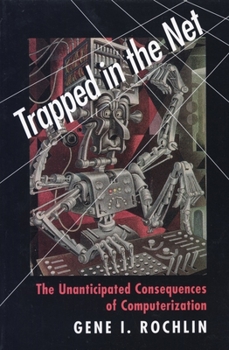Trapped in the Net: The Unanticipated Consequences of Computerization
Select Format
Select Condition 
Book Overview
Voice mail. E-mail. Bar codes. Desktops. Laptops. Networks. The Web. In this exciting book, Gene Rochlin takes a closer look at how these familiar and pervasive productions of computerization have become embedded in all our lives, forcing us to narrow the scope of our choices, our modes of control, and our experiences with the real world. Drawing on fascinating narratives from fields that range from military command, air traffic control, and international fund transfers to library cataloging and supermarket checkouts, Rochlin shows that we are rapidly making irreversible and at times harmful changes in our business, social, and personal lives to comply with the formalities and restrictions of information systems.
The threat is not the direct one once framed by the idea of insane robots or runaway mainframes usurping human functions for their own purposes, but the gradual loss of control over hardware, software, and function through networks of interconnection and dependence. What Rochlin calls the computer trap has four parts: the lure, the snare, the costs, and the long-term consequences. The lure is obvious: the promise of ever more powerful and adaptable tools with simpler and more human-centered interfaces. The snare is what usually ensues. Once heavily invested in the use of computers to perform central tasks, organizations and individuals alike are committed to new capacities and potentials, whether they eventually find them rewarding or not. The varied costs include a dependency on the manufacturers of hardware and software--and a seemingly pathological scramble to keep up with an incredible rate of sometimes unnecessary technological change. Finally, a lack of redundancy and an incredible speed of response make human intervention or control difficult at best when (and not if) something goes wrong. As Rochlin points out, this is particularly true for those systems whose interconnections and mechanisms are so deeply concealed in the computers that no human being fully understands them.Format:Paperback
Language:English
ISBN:0691002479
ISBN13:9780691002477
Release Date:July 1998
Publisher:Princeton University Press
Length:310 Pages
Weight:1.00 lbs.
Dimensions:0.8" x 6.1" x 9.2"
Customer Reviews
2 ratings
Top Notch Work
Published by Thriftbooks.com User , 23 years ago
Despite a title and a cover designed to grab the demographic who reads Wired magazine, this book is one of the sanest, most well-reasoned and well-researched books on the sociology of computing that I have ever read. To my mind, the book easily places Rochlin among the ranks of Langdon Winner and Jacques Ellul. While 'gurus' like Esther Dyson and Sherry Turkle continue to churn out fluff books about the way computing is 'revolutionizing' our lives, Rochlin returns to a quaint little practice some people used to call 'research'. As a computer systems engineer, I have been in the industry long enough to see the casual contempt that most technologists have for the user communities they serve, and I appreciate Rochlin's nuanced efforts to give historical context to these attitudes. Ours is an industry full of pampered whiners who inherited an intolerance for accountability and self-scrutiny from the think-tank darlings of the 50s and 60s, as Rochlin shows. This critique will not be a welcome one for many, and Rochlin will be accused of Luddism. But such a claim laid against a man who was a physicist for a decade is ridiculous. Rochlin not only exposes the irresponsibility of attitudes in the developer community, but also provides a welcome tonic to the hyperbole and snake-oil claims made about digital productivity gains and intelligent machines. If you are a responsible technologist and not simply another zealot who prays to the false totems of AI and the 'digital revolution', you will breathe a sigh of relief that finally SOMEONE wrote this book.
Curiously surprising.
Published by Thriftbooks.com User , 27 years ago
Although the title causes one to think of certain films involving certain speedy actresses, the subtitle, "The Unanticipated Consequences of Computerization," sets a tone more like that of the book itself.Working from the perspectives of both the natural and social sciences, Rochlin proposes the interesting idea that our great reliance upon computers and computerized artifacts has significant consequences outside of equipment failure or the deskilling of labor.Although the organization of the book is somewhat poor, I consider the text a must for anyone interested in the overall relationship between technology and human life






